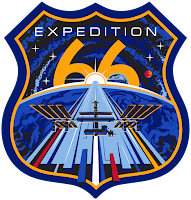ISS - Expedition 66 Mission patch.
Feb 3, 2022
NASA astronaut Mark Vande Hei has lived in space continuously for 300 days since launching and docking to the orbiting lab on April 9, 2021. He is on his way to surpassing Christina Koch’s 328-day mission on March 3 and Scott Kelly’s 340 days on March 15. Vande Hei will return to Earth on March 30 with a NASA astronaut record-breaking 355 consecutive days in Earth orbit.
CAPCOM Woody Hobaugh from Mission Control in Houston congratulated both Vande Hei and Flight Engineer Pyotr Dubrov on reaching their 300-day milestone today. Listen to the audio downlink.
Image above: NASA astronaut Mark Vande Hei studies cotton genetics for the Plant Habitat-5 space agriculture experiment. Image Credit: NASA.
Vande Hei arrived at the station aboard the Soyuz MS-18 crew ship with Dubrov and Soyuz Commander Oleg Novitskiy. Novitskiy returned to Earth on Oct. 17, 2021, with spaceflight participants Yulia Peresild and Klim Shipenko. Dubrov will remain onboard the station with Vande Hei and parachute to a landing with station Commander Anton Shkaplerov in Kazakhstan aboard the Soyuz MS-19 crew ship at the end of March.
Meanwhile, aboard the International Space Station today the Expedition 66 crew continued its space biology and human research activities. Scientists will use the data to learn how to improve health in space and Earth.
Flight Engineers Raja Chari of NASA and Matthias Maurer of ESA (European Space Agency) joined each other Wednesday afternoon for a visual function study inside the Kibo laboratory module. The investigation explores how microgravity affects the vascular function and tissue remodeling in the eye. NASA Flight Engineer Kayla Barron participated in another vision study exploring how an astronaut visually interprets motion, orientation, and distance in space.
ISS flying above the Earth. Animation Credit: NASA
Chari then examined the eyes of NASA Flight Engineer Thomas Marshburn using medical imaging gear, or optical coherence tomography. Maurer assisted the pair in the afternoon, but started his day setting up virtual reality gear for a training session in the Columbus laboratory module.
Shkaplerov spent Thursday servicing video gear, transferring cargo from inside the Prichal docking module, and setting up Earth observation hardware. Dubrov and Vande Hei partnered together and installed internal wireless gear in the station’s Russian segment during the afternoon.
Related links:
Expedition 66: https://www.nasa.gov/mission_pages/station/expeditions/expedition66/index.html
Kibo laboratory module: https://www.nasa.gov/mission_pages/station/structure/elements/japan-kibo-laboratory
Vascular function and tissue remodeling: https://www.nasa.gov/mission_pages/station/research/experiments/explorer/Investigation.html?#id=7930
Visually interprets motion, orientation, and distance in space: https://www.nasa.gov/mission_pages/station/research/experiments/explorer/Investigation.html?#id=7484
Columbus laboratory module: https://www.nasa.gov/mission_pages/station/structure/elements/europe-columbus-laboratory
Space Station Research and Technology: https://www.nasa.gov/mission_pages/station/research/overview.html
International Space Station (ISS): https://www.nasa.gov/mission_pages/station/main/index.html
Image (mentioned), Animation (mentioned), Text, Credits: NASA/Mark Garcia.
Greetings, Orbiter.ch



